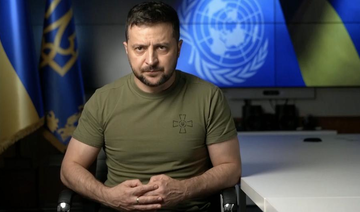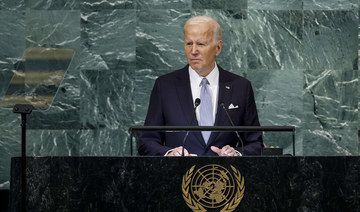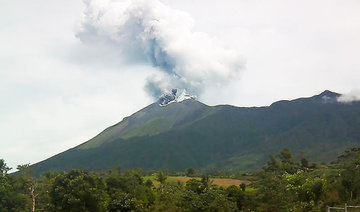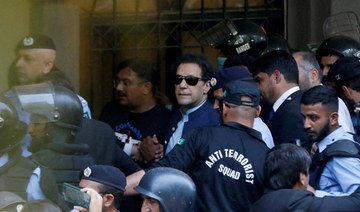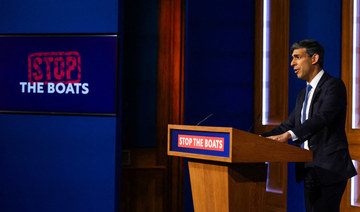UNITED NATIONS, United States: British Prime Minister Liz Truss on Wednesday accused Russian President Vladimir Putin of making “saber-rattling threats” to cover his failed invasion of Ukraine, as she told the United Nations that its founding principles were fracturing because of aggression by authoritarian states.
In her debut speech to the UN General Assembly on Wednesday night, Truss called the war in Ukraine a battle for “our values and the security of the whole world,” and extolled the late Queen Elizabeth II as a symbol of everything the UN stands for.
Responding to a statement from Putin that he was mobilizing reservists and would use everything at his disposal to protect Russia — an apparent reference to his nuclear arsenal — Truss accused the Russian leader of “desperately trying to justify his catastrophic failures.”
“He is doubling down by sending even more reservists to a terrible fate,” she said. “He is desperately trying to claim the mantle of democracy for a regime without human rights or freedoms. And he is making yet more bogus claims and saber-rattling threats.”
“This will not work. The international alliance is strong — Ukraine is strong,” said Truss, who addressed the UN on the same day Ukrainian President Volodymyr Zelensky spoke to the global gathering by video.
In a speech outlining her view of foreign policy in a world turned upside down by Russia’s invasion, Truss spoke of the queen, whose funeral on Monday was attended by many of the world leaders now gathered at the United Nations.
She said the queen “symbolized the postwar values on which this organization was founded.” She said the monarch, who died this month after 70 years on the throne, “transcended difference and healed division.”
Truss referred to a speech to the UN by the queen in 1957, in which Elizabeth said “the peoples of the world expect the United Nations to persevere in its efforts” to end conflict and crisis.
Truss said the monarch had “warned that it was vital not only to have strong ideals but also to have the political will to deliver on them. Now we must show that will.”
In her first international speech since becoming prime minister two weeks ago, Truss hailed the founding principles of the United Nations, while calling for new international alliances to circumvent the influence of authoritarian regimes.
She said “geopolitics is entering a new era” in which “authoritarian states are undermining stability and security around the world.” That was a direct shot at Russia — and also at China, whose growing clout among developing nations is a major concern for the United States and its allies.
Truss said the world’s democratic powers must woo developing nations with “strategic ties based on mutual benefit and trust” rather than “exerting influence through debt, aggression, and taking control of critical infrastructure and minerals.”
She also called for a toughening of the West’s response to Russia’s invasion. She urged sanctions on Russia and said “the G-7 and our like-minded partners should act as an economic NATO,” supporting countries targeted by “the economic aggression of authoritarian regimes.”
She urged nations to find alternatives to Russian oil and gas and protect supply chains for everything from food to minerals. “The free world needs this economic strength and resilience to push back against authoritarian aggression and win this new era of strategic competition,” she said.
Truss said post-Brexit Britain was “building new partnerships around the world,” citing its role in NATO and the Joint Expeditionary Force military group of northern European nations, whose importance has increased since Russia’s invasion of Ukraine.
She also pointed to deepening ties with “fellow democracies like India, Indonesia and South Africa” and trade ambitions with Indo-Pacific and Gulf states, a sign that Britain, now outside the European Union, sees the rest of the world — and especially Asia — as a political and economic priority.
The speech amounts to a bold statement of the new prime minister’s world view. But Truss is likely to draw criticism for linking the global fight for freedom and democracy to her own plans to change Britain’s economy.
Saying that “our commitment to hope and progress must begin at home,” Truss said demonstrating the strength of democracy “begins with growth and building a British economy that rewards enterprise and attracts investment.” To Truss, a Conservative free marketeer, that means cutting individual and corporate taxes and slashing regulations for business.
Opponents say tax cuts reward the rich more than the poor and will do little to ease a cost-of-living crisis, fueled largely by Russia’s invasion of Ukraine, that has pushed UK inflation to 10 percent, a level not seen in four decades.
Despite the economic shockwaves, Truss said Britain’s commitment to defending Ukraine “is total.”
“This,” she said, “is a decisive moment in our history, in the history of this organization, and in the history of freedom.”
UK’s new leader slams Putin, hails queen in debut UN speech
https://arab.news/rmhkn
UK’s new leader slams Putin, hails queen in debut UN speech

- Truss called the war in Ukraine a battle for “our values and the security of the whole world”
- She accused the Russian leader of “desperately trying to justify his catastrophic failures”
Alert level raised for Philippine volcano after ‘explosive eruption’: volcanology agency

- Mount Kanlaon on the central island of Negros erupted shortly before 7:00 p.m.
- Kanlaon is one of 24 active volcanoes in the archipelago nation
MANILA: The alert level for a Philippine volcano was raised Monday after an “explosive eruption” sent a plume of ash, gas and steam five kilometers (three miles) into the sky, the volcanology agency said.
Mount Kanlaon on the central island of Negros erupted shortly before 7:00 p.m. (1100 GMT), prompting warnings for nearby residents to wear facemasks due the threat of volcanic gases and falling ash.
“When it erupted we heard a thunder-like sound,” Ethan Asentista-Khoo, 35, said from his home in Pula village near the volcano.
“There was like a fire on the mouth of the volcano, which lasted around one to two minutes. I didn’t see any lava or rocks coming out.”
The Philippines is located in the seismically active Pacific “Ring of Fire” that hosts more than half of the world’s volcanoes.
Kanlaon is one of 24 active volcanoes in the archipelago nation.
Eruptions can be deadly, with pyroclastic and lahar flows as well as ashfall posing hazards to communities surrounding the volcano.
Ex-Pakistan PM Imran Khan acquitted in state secrets case, but to stay in jail

- Former leader was sentenced to 10 years in prison by a lower court on charges of making public a classified cable sent to Islamabad by Pakistan’s ambassador in Washington in 2022
ISLAMABAD: A high court in Pakistan acquitted jailed former Prime Minister Imran Khan on Monday from a conviction on charges of leaking state secrets, his lawyer and his party said, but Khan will remain in prison for now due to a conviction in another case.
Khan, 71, was sentenced to 10 years in prison by a lower court on charges of making public a classified cable sent to Islamabad by Pakistan’s ambassador in Washington in 2022.
Shah Mehmood Qureshi, who was Khan’s foreign minister during his tenure from 2018-2022, was also acquitted of the charges.
“Thank God, the sentence is overturned,” a spokesman for legal affairs from Khan’s Pakistan Tehreek-e-Insaf party, Naeem Panjutha, said in a post on the X social media platform.
Despite the acquittal, Khan will remain in prison, having also been convicted in another case relating to his marriage to his third wife, Bushra Khan, contravening Islamic traditions.
UK says Rwanda asylum seekers’ deportation flights to begin on July 23

- Policy of sending asylum seekers who arrived in Britain to the East African nation is one of Rishi Sunak’s flagship policies
(Adds details in 2, 3rd paragraphs)
LONDON: The British government says it intends to begin deporting asylum seekers on July 23, court documents showed on Monday, although the controversial scheme is dependent on Prime Minister Rishi Sunak’s Conservative parties winning the upcoming election.
The policy of sending asylum seekers who arrived in Britain to the East African nation is one of Sunak’s flagship policies but legal and parliamentary obstacles have meant it has never got off the ground.
Sunak recently said the deportation flights would not leave before an election on July 4 but he has promised if he wins they would begin soon after, although he is trailing the opposition Labour Party by about 20 points in opinion polls and it has promised to scrap the plan.
In documents submitted to the London High Court as part of a charity’s challenged to the policy, government lawyers said the intention was “to effect removals with a flight to Rwanda on 23 July 2024 (and not before).”
Facing ‘systematic’ pressure to recognize Israel, Indonesia stands firm on Palestine support: FM

- Indonesia was among the first countries to recognize Palestinian statehood in 1988
- In April, Israeli media reports claimed Jakarta began OECD-brokered talks with Tel Aviv
JAKARTA: Indonesia will continue to support Palestine in the face of systematic pressure from Israel and its allies to normalize ties with Tel Aviv, Foreign Affairs Minister Retno Marsudi said on Monday.
Jakarta has no diplomatic relations with Tel Aviv and has been one of the most vocal supporters of Palestine since the beginning of Israel’s onslaught on Gaza in October. The Indonesian government has repeatedly called for an end to the occupation of Palestinian territories and for a two-state solution based on pre-1967 borders.
Speaking to university students at the Gadjah Mada University in Yogyakarta on Monday, Marsudi highlighted the “worsening situation” in the besieged enclave — where over 36,400 Palestinians have been killed — and said that Israel has been making “strategic and systematic efforts to finish off” Palestine.
“There are systematic efforts by Israel and its allies to … lobby and pressure Muslim countries to start considering opening up and normalizing ties with Israel,” she said.
In April, viral Israeli media reports claimed that Jakarta had plans to establish diplomatic ties with Tel Aviv as part of a deal to smooth Indonesia’s entry into the Organization for Economic Cooperation and Development.
But the Indonesian Ministry of Foreign Affairs swiftly rejected those claims then, saying that the world’s most populous Muslim-majority country would remain consistent in defending Palestine.
One of the staunchest supporters of Palestine, Indonesia was among the 78 countries to first recognize Palestine in 1988. It sees Palestinian statehood as mandated by the nation’s constitution, which calls for the abolition of colonialism.
Indonesia will continue its support for Palestine on the international stage, Marsudi said, including by pushing for an immediate and lasting ceasefire and urging Tel Aviv to comply with an order by the International Court of Justice to stop its military offensive in the southern Gaza city of Rafah.
Israel’s ground and air attacks have in the last eight months destroyed most of Gaza’s civilian and medical infrastructure, injuring over 82,000 people while thousands remain missing under the rubble.
The Israeli military has also blocked water, food and aid supplies to the territory, bringing its more than 2 million inhabitants to the brink of famine.
“Indonesia has consistently upheld universal principles and values to continue supporting the nation of Palestine. Consistency in embracing these principles is not easy. It’s truly not easy to keep this principle amid today’s messy world filled with pressure and promises of transactions here and there,” Marsudi said.
“But thank God that until this very moment, the Indonesian government has been able to remain steadfast and consistent in defending the nation of Palestine … We have a duty to defend justice and humanity because it is in line with the mandate of our 1945 constitution.”
Indian Islamic center warns Muslims against felling trees

- Much of northern India has been gripped by a deadly heatwave with temperatures above 45° Celsius
LUCKNOW: One of India’s most influential Islamic centers has warned Muslims not to chop down trees or burn fields after harvesting to help stem climate change and surging temperatures.
Much of northern India has been gripped by a deadly heatwave with temperatures above 45° Celsius (113 degrees Fahrenheit), killing scores of people by heatstroke.
“Every Muslim must ensure no green trees and crops are set on fire,” Khalid Rasheed Farangi Mahal, chair of the Islamic Centre of India, said.
Mahal, a top scholar in the northern city of Lucknow, issued the non-binding fatwa or ruling on Sunday, saying that the religious duty of Muslims to conserve greenery and water was “stated in the Qur’an”.
“Burning trees and crops is forbidden in Islam and is considered a grave sin,” read the fatwa, published in Urdu and Hindi.
He also urged Islamic clerics to encourage stewardship of the environment during their sermons – telling people to take care of the trees around them.
“Instead of merely planting a sapling symbolically, it is more meaningful to take care of existing plants and trees,” he said, urging Muslims to prevent pollution of waterways and the sea.
Last week, an Indian court urged the government to declare a national emergency over the country’s ongoing heatwave, saying that hundreds of people had died during weeks of extreme weather.
The High Court in the western state of Rajasthan, which has suffered some of the hottest weather, said authorities had failed to take appropriate steps to protect the public from the heat.
India is no stranger to searing summer temperatures but years of scientific research have found climate change is causing heatwaves to become longer, more frequent and more intense.
Researchers say human-induced climate change has driven the devastating heat impact in India and should be taken as a warning.



